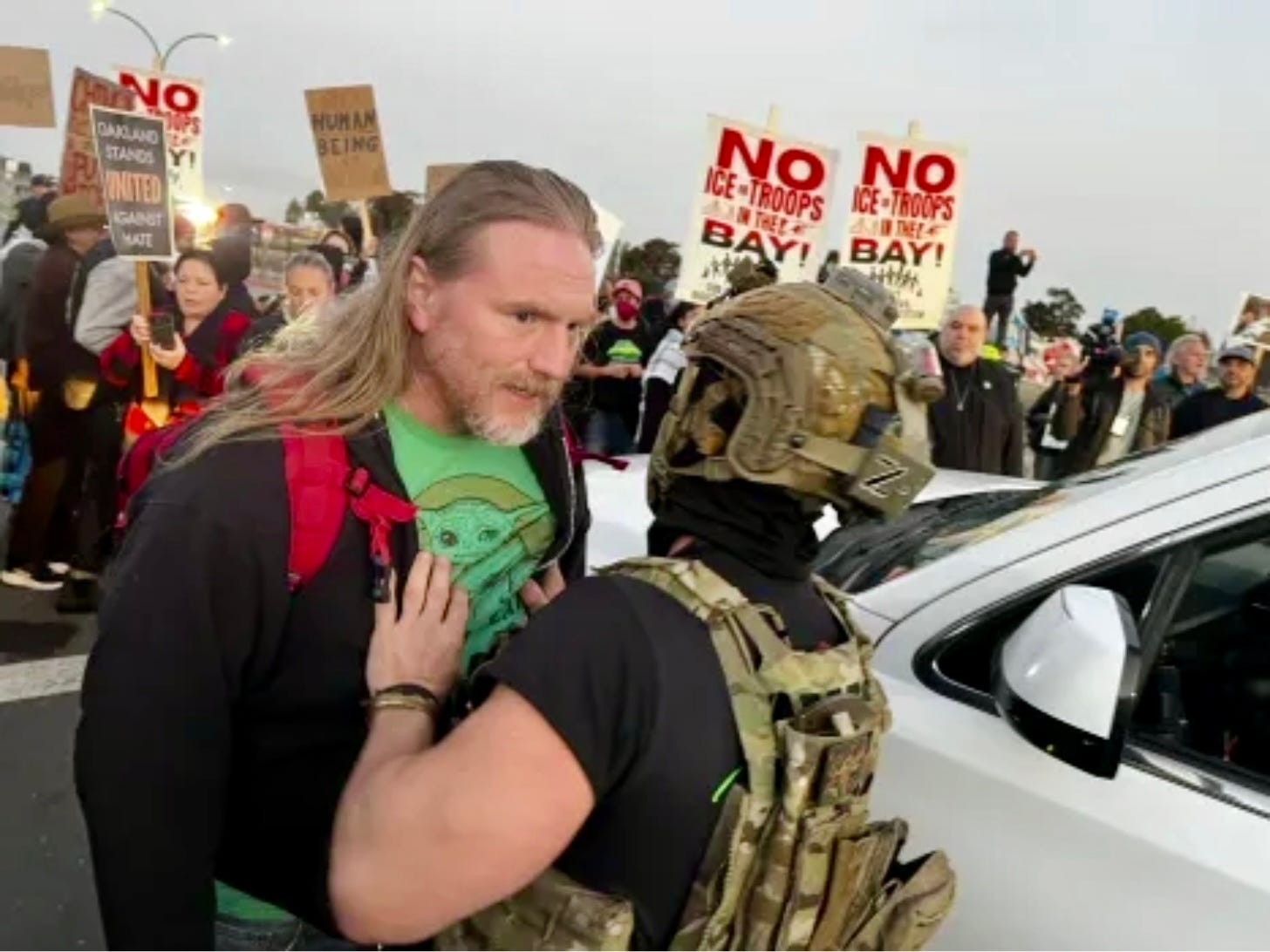How Americans Are Blocking Trump’s Militia
Ordinary people in forgotten places are standing between families and fear.
The Digital Drumbeat by DemCast is fueled by defiance and determination. Subscribe—free or paid—and stand with the writers, organizers, and dreamers keeping democracy alive.
They thought small towns would stay quiet. They thought fear would keep people home.
But from Idaho to Virginia, the ground is shifting. The raids still come, but now the people are waiting: phones charged, cameras ready, hearts steady.
We don’t run anymore.
We hold the line.
Raids Met With Cameras, Not Silence.
In Wilder, Idaho, federal agents burst into a local horse arena during what they claim is an “illegal gambling” raid. They drag away a mother in front of her three children, one of whom later tells reporters, “They said they’d blow my mom’s head off.” By sunrise, the town gathers outside City Hall demanding answers. Families hold phones and hand-painted signs that read Not in Our Town. When agents return, they find cameras pointed right back at them. The raid fizzles; the people stay.
Stories like Wilder’s spread through encrypted group chats and neighborhood networks. Every new attempt at intimidation meets a crowd, a camera, or a chorus of witnesses refusing to look away.
Farm Fields Become Freedom Lines
In the farmland outside Woodburn, Oregon, ICE detains two young men and an elderly grandfather. By nightfall, their neighbors surround the fields blowing whistles, filming, and sharing locations in real time. Videos of the arrests go viral within hours, turning a local tragedy into national proof of resistance.
Now, farmworkers take turns patrolling the edges of the fields, radios in hand, calling out when government trucks appear. “We know what solidarity means,” one picker says. “We’re not giving it up to a man in a mask.” Accounts from Oregon’s agricultural corridor show how these night watches have already stopped detentions in progress.
Shelter Rises in Every Town
Across the country’s smaller towns, our faith leaders open sanctuaries rather than doors for agents. A pastor in Portland, Oregon tapes a sign on his church: ICE, you need a judge’s warrant. His sermon echoes a phrase that ripples through our sanctuary network: “An unjust law is no law at all.” Local congregations keep their lights on through the night, housing families on pews and in classrooms transformed into small apartments.
In Austin, Texas, another congregation still shelters a mother and son who fled violence years ago. Their pastor says, “If there’s truly religious freedom in this country, then we are free to obey scripture and love our neighbors as ourselves.” That conviction spreads through our rural church networks faster than fear ever could.
Unions Stand Guard
In the small industrial towns of Washington State, machinists and warehouse crews rewrite our contracts to require employers to give twenty-four-hour notice before any federal audit — a single sentence now protecting hundreds of immigrant workers. One machinist keeps bail money in a metal lunchbox labeled ICE OUT. At shift change, we pass it hand to hand like communion.
After ICE tackles a union leader in California, demonstrations ripple through our union halls nationwide. “An injury to one is an injury to all,” the chants echo through factory walls and farmland alike. Worker testimonies and contract clausesare spreading faster than intimidation.
Families Refuse to Break
Inside homes across Ohio, Nebraska, and Wisconsin, we quietly prepare for the unthinkable. We draft guardianship papers for our U.S.-born children, memorize hotlines, and tape emergency numbers to the fridge.
One Honduran couple in Washington, D.C. signs over temporary guardianship of their seventeen-year-old son to his best friend’s parents. “He needs to finish school and go to college,” the father says, knowing he may never see graduation day. Across America, our families repeat this ritual of love turned legal protection. Our defiance isn’t loud; it’s unconditional.
The People Are the Firewall
The government counts on fear to do the silencing. Instead, it meets a wall of humanity.
In Richmond, Virginia, volunteers from Richmond Defensa train neighbors to film raids, share real-time alerts, and confront agents with calm authority. Coffee shops double as classrooms for “Know Your Rights” sessions. A woman filming from a third-floor balcony yells a detainee’s name so others can record it. Within an hour, the footage circulates online with a hotline number for legal aid. The community’s eyes become its shield.
From Illinois to North Carolina, from Idaho to Virginia, that shield grows stronger. Cameras roll. Whistles sound. Church bells ring. Each action says: you cannot terrorize a people united in protection.
Resistance Takes Root
The regime wants quiet. It gets noise.
It wants darkness. It gets phones, flashlights, and livestreams.
It wants obedience. It gets angry neighbors.
Everywhere it tries to sow fear, small-town America plants resistance: church pews, cornfields, classrooms. Democracy doesn’t live in marble buildings; it survives in the hands of people who still believe in each other.
So keep bearing witness. Film what you see. Share the truth when power lies. Connect with the local food banks, faith and activist networks, and mutual-aid groups already standing with immigrant families. Their work keeps people fed, safe, and seen.
Because the only wall that holds is the one built of courage.
And right now, it’s made of us.




Thank you so much for telling us about all of this!! I’m 84, living in a large home for seniors, so I don’t get to see all this happening, but I am profoundly grateful that people are caring for their neighbors and confronting ICE brutality. America’s diversity is our strength, and we must love and respect each other if we are to be a decent nation. I love all of you for fighting for what’s right!
Thank you for this. It helps to hear how people/communitiea are working together to so the right thing.